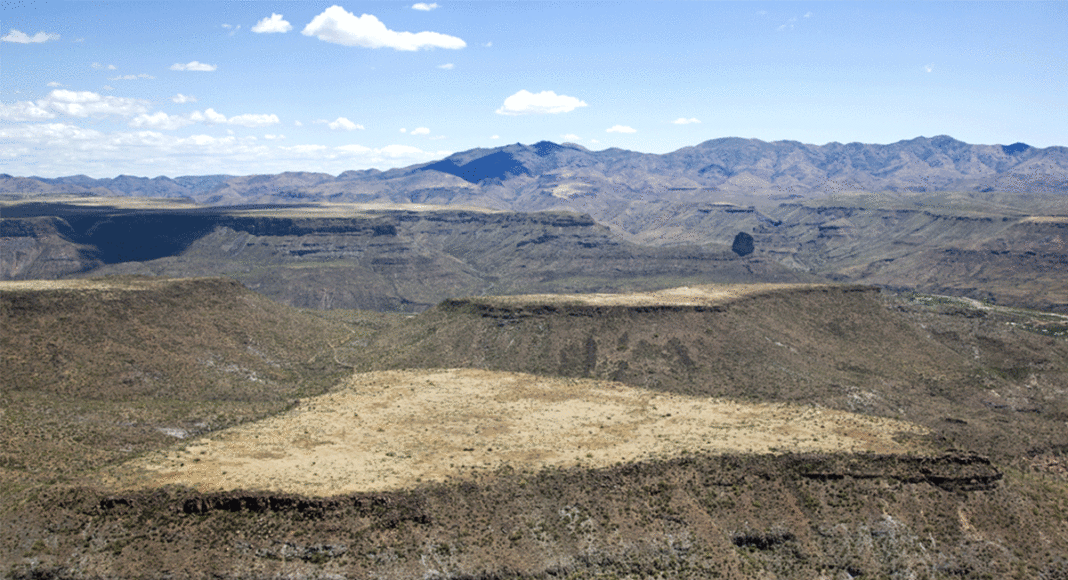More than 100 people worldwide, including several from Santa Cruz, will travel to Black Mesa, Arizona on Thanksgiving weekend to support the Navajo and Hopi people in their fight against relocation. The 1.8-million-acre mountainous mesa is home to ancestral lands that have been desecrated by two coal mines established in the late 1960s.
More than 12,000 Navajo and Hopi citizens were forced to relocate after the 1974 Navajo-Hopi Land Settlement Act, a deal that Navajo leaders say favored coal companies and drew an arbitrary dividing line between the Navajo and Hopi nations.
Today, hundreds of people on the land continue resisting in the face of a government strategy to “starve them out,” says Cat Wilder, a volunteer with Santa Cruz Indigenous Solidarity and Support (SCIS).
The Bureau of Indian Affairs (BIA) and Hopi police are forcibly taking their sheep, Wilder says, and they aren’t allowed to repair or build any structures.
“The BIA is taking their herds. They claim it’s to prevent overgrazing, but they set the limits in such a way that the people cannot subsist off their animals,” says Wilder, a community organizer and environmental educator.
While the two nearby coal mines employ hundreds of Hopi and Navajo people, and provide millions of dollars to the Hopi and Navajo nations, activists and resisters argue it’s doing more harm than good. Wells are being poisoned by mining runoff, they say, and the sacred surrounding mountains have been blown up and mined out, while smog clogs the air, causing respiratory illnesses.
“All the families we support don’t have electricity or running water,” says Wilder. “They are resisting forced relocation by continuing their traditional way of life and protecting their sacred spaces.”
SCIS is hosting its ninth annual Santa Cruz fundraiser for families at Black Mesa on Saturday, Nov. 12, and will be sending about a dozen people with supplies during Thanksgiving week to help with tasks like sheep herding, repairing roads and hauling water.
The group is looking for donations of building materials for fencing and roofing, tools like axes and chainsaws, laptop computers, food and more. For a full list and information on how to donate, contact 831-708-8199 or
sh***************@gm***.com
. Donations are accepted through Nov. 15.
Wilder says their struggle against the coal industry mirrors activism happening nationwide, including in North Dakota, where tribes are fighting a much-publicized oil pipeline: “We don’t see this as just about Black Mesa. Indigenous people are fighting for cultural survival and the survival of this earth.”
The SCIS benefit dinner for the families of Black Mesa will take place from 6-9 p.m. on Saturday, Nov. 12 at the Louden Nelson Community Center in Santa Cruz. There will be Native American speakers, food and short films. Admission starts at $5, with no one turned away for lack of funds. ARDY RAGHIAN
TREASURE GROVE
Union Grove Music will close permanently at the end of 2016, its 44th year. Richard Gellis, owner of the downtown Santa Cruz store, has been overwhelmed and excited by the support he’s received since announcing his retirement this past week.
“I’m settling down to the stuff I enjoy the most,” says Gellis, who plans to keep music in his life.
Music lovers lined up around the block Thursday morning in hopes of getting first pick of Union Grove’s discounted merchandise. The Pacific Avenue shop is in the process of liquidating everything in the store and will have an ongoing sale through Christmas Eve.
More than 400 customers poured into the shop Thursday, Gellis says, many of them to thank him and congratulate him on retiring.
Union Grove has held community events throughout the decades, including a 1990 event that set a Guinness World Record for the most guitarists playing the same song at the same time. The gathering was a benefit for earthquake disaster relief in response to the 1989 Loma Prieta earthquake. Over the years that followed, Union Grove continued to host large-scale music events to raise funds for music and arts programs in local schools.
Looking ahead, Gellis is thinking about possibly opening a smaller shop, one that could serve as a hub for online vintage instrument sales, as well as repairs, to give him a more flexible schedule. MATTHEW PERA












